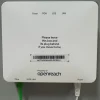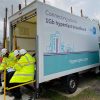Broadband ISP Vodafone UK Confirms Start of IPv6 Rollout

Customers of Vodafone’s home broadband service, which is sold via FTTC and FTTP packages on Openreach and CityFibre’s national networks, may be pleased to learn that the ISP has finally confirmed to ISPreview – after some prodding – that they are starting to run a “limited trial” of IPv6 internet addressing.
Internet Protocol (IP) addresses help to connect your software and devices with others around the online world – like an ID number for your connection. Unfortunately, the IPv4 address space could only handle 4 billion addresses and that has long been exhausted (except for the resale of existing addresses), which means that in the future ISPs will need to use the new IPv6 standard in order to continue adding new connections without compromise.
Sadly, the longer form IPv6 addresses are not directly compatible with older IPv4 addresses and so the two will need to be run side-by-side for many years to come (i.e. until the vast majority of the world has enabled IPv6), which creates some added costs and complications for ISPs that implement it. As a result, some providers have been dragging their feet on adoption for years, preferring instead to rely on their existing pool of IPv4s.
Advertisement
Vodafone have long been one of those remaining laggards, at least among the big ISPs. But all that just changed. The first sign that something was afoot came at the end of last month, when broadband customers reported experiencing an unusual routing bug that went away when users disabled the IPv6 setting on their routers (here).
At the time we speculated that this could actually be indicating preparations for a future IPv6 deployment, although Vodafone initially declined to confirm such a plan. Since then a tiny number of customers have informed us that they were recently assigned a working IPv6 address, which we were able to verify. Furthermore, the provider’s ASN has started showing a clear increase in IPv6 activity (here), and now they’ve finally acknowledged it.
A Vodafone Spokesperson told ISPreview:
“We started a limited trial for the dual-stack connectivity for around two thousand customers between July and October, which is reflected on the ASN. “
The provider also confirmed to us that the “majority” of their “new” broadband customers “will be getting dual-stack i.e, IPv4 and IPv6 connectivity” and, in addition to that, they’re “presently in the process of migrating existing customers to dual-stack.”
The migration process for this is likely to be a fairly gradual one and there’s still a question mark over the timescale involved, although it wouldn’t surprise us if the process took a few months (or possibly longer) to reach completion. The aforementioned bug shows precisely why it’s important not to rush such deployments.
Advertisement
Mark is a professional technology writer, IT consultant and computer engineer from Dorset (England), he also founded ISPreview in 1999 and enjoys analysing the latest telecoms and broadband developments. Find me on X (Twitter), Mastodon, Facebook, BlueSky, Threads.net and Linkedin.
« CityFibre Deal Expands FTTP to 500 Homes in Newark and Sherwood























































Virgin Media’s going to be the last of the major ISPs to roll out IPv6 to customers and I’m not confident they’ll handle it any better than Vodafone.
Or TalkTalk 🙂
My ISP Cuckoo is IPv6 enabled and they’re a pretty small provider, benefits of a monthly rolling contract to although not the cheapest.
@Random Precision Cuckoo isn’t an ISP, they are a marketing company using social media and other tactics to get ‘customers’ and never built their network. The broadband is supplied by TalkTalk who supports IPv6, and all Cuckoo had to do was develop their own stationery, branding and marketing strategies, they were even quite open this, selling their services to others who wanted to start a company. Despite all the rhetoric about wanting to be different which was all part of the marketing, they sold the business as soon as they could make some money from it, which was their goal all along.
The business is now merging with Giganet, Jurassic Fibre and Swish under the collective name of AllPoints Fibre who will become a wholesaler, with Cuckoo being their own retail business.
Don’t forget Plusnet 🙂 But even they are making noises (again) about trialing IPv6. So my money is on Talktalk being the last.
Re Cuckoo: it seems unlikely they are reselling the Talktalk retail service, which doesn’t do IPv6. More likely they’re using Talktalk’s wholesale network (which doesn’t care what protocol you’re using) and terminating the sessions in their own network and routing over their own transit, which *does* make Cuckoo an ISP in their own right.
To check this, a Cuckoo user should go to https://bgp.he.net/ and see what autonomous system their IP address is from.
@NE555 they would be using a wholesale service, wholesale businesses do various levels of product, one might just be delivering the data to the ISPs data centre to providing the whole thing from white labelled billing and providing the Internet connectivity. If you go to peeringdb.com and search for Cuckoo, you will not find them as they don’t have their own kit or IP addresses. Anyone can start up an “isp”, you need a limited company and just approach Zen Wholesale, BT Wholesale, TalkTalk Wholesale , Entanet/CityFibre Wholesale and get set up with them and they will do everything from booking Openreach to providing the Internet, and you just bill your customers, pay a cut to the wholesale and offer first line support.
Cuckoo got bought a while ago, if you’re one of their older customers you’ll still be on TalkTalk Wholesale, if you joined more recently you may be on the Giganet network.
I have a friend who has been on Cuckoo since before the acquisition for their business and their IP still shows as TalkTalk. They plan to switch to TalkTalk Business in the near future due to much better pricing and concerns of being migrated to Giganet’s poorly rated network.
Dual stack then or only ipv6? CGNAT is a nightmare on end user side if you cant get a static ip.
Are Vodafone using CGNAT ? If they are that won’t change, IPV6 will be dual stacked separately. A lot of things like Security Camera systems are still quite often IPV4 only and need a public address to remote access.
We say dual-stack above.
It looks like they’re handing out /56s… Any idea if that prefix is static? IMHO it should be, but…
Yes Ben, the /56 delegation is pretty standard with v6 and it is (or has always been in my experience) static, double check with your particular ISP to be certain. It’s a /56 that gets delegated to each customer.
Indeed – I tried contacting Vodafone but they didn’t seem sure. I was hoping someone else might’ve got an answer out of them!
I guess it’s too new for the support team to know. It would be weird if the prefix delegations were dynamic, there’s no real point or need to make them dynamic under v6, and a change of prefix would mean all devices on your network would have to reconfigure, and all static hosts would have to be manually changed as well, so it would be a bit of a crazy situation if that were the case.
Are you able to open a support ticket perhaps?
/56 is pretty standard (RFC6177) and if they’ve got that bit right I’d hope they’d keep it static.
OTOH I’ve heard of some wierd implementations over the years.. you can never be entirely sure.
/56 is standard, and it might be quite sticky, but probably won’t be static, ISPs need to be able to move connections around between BNGs and that means moving to a new address pool, so I doubt you won’t be able to bank on it staying the same all the time even if it doesn’t change much. Static IPs, even v6 are usually sourced from a more centrally located BNG for customers that need it, it is that, or the ISP carries a huge number of /56s around in their routing table to wherever the customer is.
If Vodafone turns out not to be static and you absolutely want a static delegation, consider a provider like A&A, Cerberus, IDNet, etc. I’ve used/using them all over the years and the prefix delegations are static.
Just confirming — Vodafone’s delegation is not static. The original prefix was 2a0a:ef40:845:7c00::/56, but after a power cut (lasting approximately 2 hours) it changed to 2a0a:ef40:86b:8400::/56.
I tried contacting their support team to ask for a static IPv6 prefix, but that went about as well as you would expect. I’m not blaming Vodafone here, it’s entirely expected that IPv6 stuff isn’t on the scripts for customer support yet.
I don’t strictly need a static prefix, but it’s a bit weird that I have a static IPv4 address and a dynamic IPv6 prefix — feels like that should be the other way around!
would be great for ee to do it too
The ‘new’ EE Broadband – a re-brand of BT Broadband, will do it, because it is just the same as BT Broadband which has done it since 2016. You old EE Broadband hub won’t get upgraded.
Plusnet are finally going for it: https://www.ispreview.co.uk/index.php/2023/11/broadband-isp-plusnet-uk-prep-new-ipv6-technical-trial.html
@NE555 I used that link and it’s Cloudflair Inc who’s the ISP, my knowledge is limited not sure what that is but it all works so that’ll do me.
CloudFlare are a US web services company that provide DNS and security services amongst other things. Are you connected to workplace WiFi?
or, are you using a Mac or iDevice with iCloud private relay enabled. CloudFlare are one of the suppliers of that service to Apple.
@Ivor Yes I use an ipad and private relay is enabled and I’m not connected at work, at home I’m fortunately retired.
Virgin will be last to the party by a country mile.
On what basis do you make this claim? I think if and when it looks to significantly benefit their customers and shareholders they will make the change.
Thank goodness! About time!
I work for an ISP that peers with Vodafone, and they are about the only network I’ve come across that doesn’t peer over IPv6 (even networks that don’t use much IPv6 at least run it on their core network and can peer over it!).
So even if Vodafone do suddenly enable IPv6 for their customers, as thing stands their IPv6 peering is going to be inferior to their IPv4 peering, i.e. your IPv6 traffic will take longer routes.
You can see this here where only IPv4 addresses are published for their internet exchange connections: https://www.peeringdb.com/net/11238
I spoke with Vodafone this evening via their chat app and the agent told me IPv6 was only being delivered to FTTP customers at the moment. This didn’t help me because I’m in a unloved area where OpenReach & City Fibre aren’t currently planning to do any builds for the foreseeable future… Right now my only hope for fast internet is Giganet.
I hope Voda are finally taking action on IPv6 because they’re long overdue on it IMO but until ipv6.google.com actually works for me without having to use a timeline service like he.net, I don’t hold my breath! I, like many others, have been waiting years already! 🙂
Well looks like I’ve got the dual slack… No ipv6 and sluggish pings via Scotland